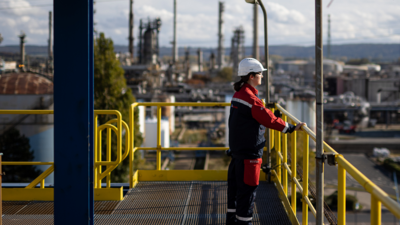Bringing the lessons of sustainability from the classroom to life
Published on April 26, 2023
4 minutes

Luana Cattan may still be studying chemical engineering in university in Brazil, but she’s already planning how she will contribute to a low-carbon future once she graduates. Thanks to Air Liquide’s Summer School program*, she has a better idea of the role that industrial companies are playing in reducing society’s carbon footprint – and more motivation than ever to contribute to the cause.

“Corporate social responsibility will be the most important criterion in the job I choose when I am ready to join the workforce. I need to feel comfortable with my work, so joining a company with a strong sustainability agenda will be a requirement. I believe major industrial companies have a responsibility to develop realistic solutions for a climate-neutral future and to start implementing them.
”
What led you to discover the world of Air Liquide?
After taking part in several Scientific Olympics in high school that furthered my love of chemistry, physics and math, I enrolled in a dual degree Chemical Engineering program that leads to qualification both here in Brazil and in France. I thus did some research into French industrials, and so I was already familiar with Air Liquide when a fellow student recommended the Group’s Summer School Program to me and encouraged me to apply. I was accepted and got to participate in the week-long program. It was a unique opportunity to innovate and collaborate with my peers from around the world, and it helped me to better understand myself and my goals for the future.
Did you enjoy the program?
Yes, I enjoyed it very much! There were a lot of good things about it, but the most meaningful part was interacting with Air Liquide employees: people from various areas of the company took time out of their schedules to explain their areas of work to us. They were so enthusiastic about their jobs and the company – including Air Liquide’s ambitious climate goals – that it was contagious. I was particularly inspired by a presentation where we discussed both our own carbon footprint and that of Air Liquide. It gave us a better understanding of the greatest sources of carbon emissions, their impact and the Group’s main initiatives to decarbonize. In my view, Corporate social responsibility is incredibly important, and I was impressed by how honest people at Air Liquide were about the scale of the challenges we face and how serious they were about responding to them.
Another positive aspect was the opportunity to network with other participants. We worked together to develop a business case for attracting young women to engineering, and that was a great experience (and not just because we won, either!).
Has the program helped you professionally?
Yes, it really has. The most important thing the Air Liquide Summer School did for me was to demonstrate that there are companies out there who take their responsibility to future generations seriously. This confirmed that a sustainability oriented career path in engineering is both possible and open to me in the future. It’s reassuring to know that major companies that share my values exist.
How did the Summer School expand your understanding of CSR**?
The Summer School showed me just how broad CSR is as a topic. I learned about the importance of inclusion, and how it’s key to supporting diverse teams, for one. I also got to learn about the Citizen at Work Program, which gives Air Liquide employees the opportunity to volunteer in their local communities. This reinforced the larger idea that companies have a key role to play in society and that their actions can benefit entire communities. I know I’ll be keeping these insights with me in my future!
So corporate social responsibility will be an important criterion for you when looking for a job?
The most important one! You need to feel comfortable with what you are doing at work, so working for a company with a strong sustainability agenda is non-negotiable for me. Major industrial companies have a responsibility to develop realistic solutions for a climate-neutral future and to start implementing them.

